Enemies Foreign and Domestic
Will of Robert Shell of Berwick-upon-Tweed, gunner
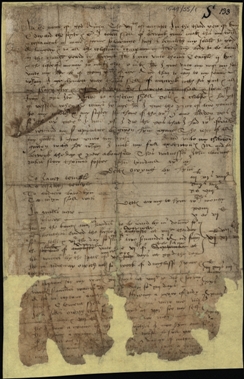
Shell's will contains a list of debts which reveal that he was owed his wages for campaigning in Scotland between June and September 1548, including monies owed to him for 'work of Dunglasse Hume [and] Roxbrugh' - all fortifications either captured or repaired by the English during the 1544-1551 wars. This conflict originally sparked from the failure of Henry VIII's plan to unite the kingdoms of England and Scotland through the marriage of his son Edward to Mary Queen of Scots, then aged 5 and 6 months respectively: the pressure ultimately resulted in the betrothal and later marriage of Mary to François II of France. The probate registry contains an unusually high number of Berwick military wills in 1548-49, which probably reflect the Scots' siege of Haddington castle and its eventual evacuation in September 1549.
Ref: DPRI/1/1549/S5/1.
![]()
Nuncupative will of William Claveringe of Duddoe, esquire
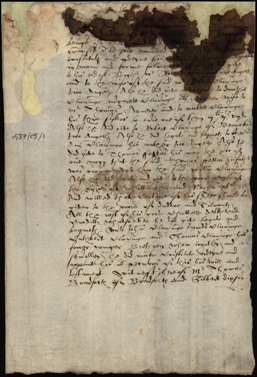
Claveringe made his will in his last moments 'sore wounded in his bodie'. Contemporary accounts relate that he had been one of a party ambushed on the hills above Stanton in Northumberland returning home from Newcastle where they had been celebrating the anniversary of the accession of Elizabeth I. A retainer of the Collingwood family, Claveringe was a victim of that family's feud with the Selbies. Despite, it was said, Collingwood's wife pleading on her knees that no violence be done, Claveringe was shot and his brother was also wounded. A memorial stone called Clavering's Cross still stands on the hill where this encounter took place. The Clavering family appear to have been satisfied with monetary compensation in this instance, rather than pursuing a feud themselves. Feuding was a common feature of the border community life, 'surnames' acting in mutual solidarity for their own protection and survival. In this instance the Collingwoods and Selbies engaged in a long correspondence defending their actions to Secretary Walsingham at London, and trading accusations of March treason (colluding with the Scots), but their accounts so involved and partial it is hard to know the true cause of the incident. The damage to the document, now repaired, is caused by water rather than blood!
Ref: DPRI/1/1587/C5/1.
Will of John Carre of Hetton, Chatton, with an Allegation concerning its validity
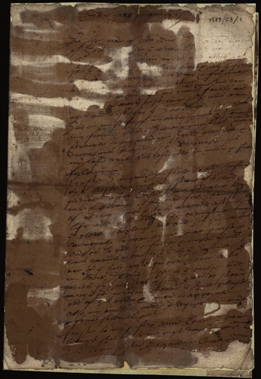
Carre had conscientiously made a will prior to his departure on an expedition to Portugal, depositing it safely with a trusted cousin. This adventure was the little known 1589 English Armada, a disastrous counterstroke to the Spanish Armada of 1588. He never returned, and his sisters speedily obtained a grant of administration, rashly as it turned out for the will then came to light, as also a first-hand account of Carre's death in Portugal. With an eye to his 'longe & peralus' voyage south Carre writes, 'my bodie I comite ether to the earthe birdes foules fyshi[es] seas or sands'. The document also bears witness to its custodians' changing attitudes towards its preservation. The brown staining was caused by the application of a tannin solution, which by reacting with the iron in the ink brings out the text, so making it more legible. In the 20th century the document was professionally conserved. The allegation is written in Latin, but with Carre's words on his deathbed in Lisbon transcribed in the vernacular in which he delivered them: 'I have made my will before my cominge out of England all with my owne hand and left it with my Cosen Thomas Carr; That will and all there in conteyned is my will and shall stand and not be alterd'.
Ref: DPRI/1/1589/C3/1, 4-5.
Inventory of William Collingwood of Kemerston, Ford
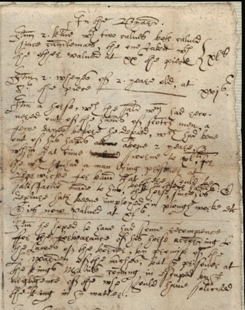
Collingwood's inventory reveals a very late glimpse of the ancient border laws, soon to be abolished by James I in 1605. The border marches on both sides of the English-Scottish border comprised a separate and international jurisdiction under a body of laws first codified by England and Scotland in the mid-13th century. In effect a martial law, it provided for the more efficient provision of justice across two national jurisdictions at a time when the marches were in a more or less constant state of violent unrest, and were intended also to prevent such low level violence escalating into international incidents. Collingwood appears to have been the victim of a Scotsman stealing his horse and then using it on his farm over the border. More than a year later Collingwood reports he had succeeded in capturing the thief and recovering his horse, much exhausted from ploughing, and had had the man imprisoned at Berwick. Unfortunately he had escaped before Collingwood succeeded in extracting any recompense 'for the forbearance of his horse according to the laws of the border'. When such laws were operating properly then reivers in effect farmed the communities they preyed upon, 'borrowing' certain assets like beasts of draught at certain times of the year, and often returning or releasing the animals subsequently so that the cost of feeding and conditioning them was again borne by the owner. Protections from these attacks could be obtained by paying to the reivers a black mail or rent. In bad years, however, there was no law of any kind, and inhabitants of the marches either side of the border lived in constant uncertainty and terror.
Ref: DPRI/1/1603/C8/1.
Inventory of Sir George Bowes of Wolsingham
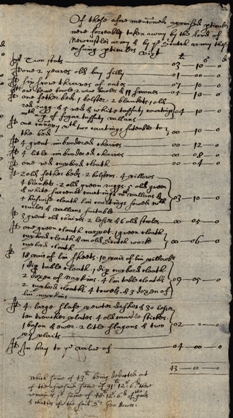
Bowes' inventory illustrates the uncertainty and disturbance of the times, the country wracked by civil war. His property was pillaged by both the Marquess of Newcastle's army and the 'Scotch army' some time after the invasion of a Scottish army under the Earl of Leven in January 1644 and before Newcastle's royalist army abandoned County Durham in April. The inventory of items 'forceably taken away' includes grain, hay, a horse, but also a bed and various interior furnishings. A Sedgefield probate account from April that year includes consecutive entries for levies made by the two opposing armies then encamped only five miles apart. The Scots pursued Newcastle's army south into Yorkshire on 13 April 1644 leaving only Newcastle city in royalist hands.
Ref: DPRI/1/1647/B7/1.
Inventory of Roger Widdrington of Harbottle, esquire
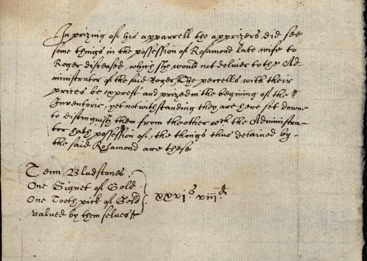
Widdrington and his wife were notorious recusant Catholics in a time when the laws of England penalised them heavily in both fines and forfeiture of lands for holding to their faith and refusing to attend the services of the established church of England. At one time Widdrington had been suspected of involvement in the Gunpowder Plot. Widow Rosamund Widdrington had a strong incentive not to cooperate with the appraisers and to hide what wealth the government had not already succeeded in confiscating during her husband's lifetime. Her efforts appear to have been only partially successful: the appraisers here are careful to note even Widdrington's signet ring and gold toothpick that his widow had refused to part with. This time was a particularly tense one for English catholics due to Charles I's rumoured plan to deploy an Irish army in England. Roger's heir was later heavily penalised for his and his father's support for the king in the civil war, Cartington Hall being seized in May 1648 by Major Sanderson, copies of whose will and diary are also held in the library's collections.
Ref: DPRI/1/1641/W8/1-5.
Deposition concerning the will of John Prest of Black Horse near Tudhoe, yeoman
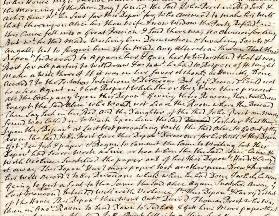
A strong motivation for a testator to leave a final will and testament is to provide the next of kin with clear instructions so that any later controversy might be prevented. Publication of a final will being required it is understandable that a testator usually made a will when close to death. But when the family were already alienated from each other then the making of the will itself could be a pressured or resisted act; wills might be suppressed; or a more favourable codicil fortuitously discovered later. Alice Prest did her utmost to prevent her dying but clearly estranged husband from bequeathing his property away from her and her family, refusing to leave the room and then tearing up two drafts so that his attorney had to send to his office for more paper. It is this attorney, Ralph Harrison of Durham, whose testimony is contained in this document.
Ref: DPRI/1/1750/P9/5-6.
![]()


